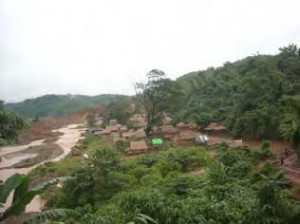Rampant Land Confiscation Requires Further Attention and Action from Parliamentary Committee
By Burma Partnership • March 12, 2013 This past week the parliamentary Farmland Investigation Commission submitted its report on land confiscation to the parliament. The report finds that the military have taken almost 250,000 acres of land from villagers. The commission stated that they had spoken to military leaders about the confiscation, “Vice Senior-General Min Aung Hlaing […] confirmed to me that the army will return seized farmlands that are away from its bases, and they are also thinking about providing farmers with compensation.”
This past week the parliamentary Farmland Investigation Commission submitted its report on land confiscation to the parliament. The report finds that the military have taken almost 250,000 acres of land from villagers. The commission stated that they had spoken to military leaders about the confiscation, “Vice Senior-General Min Aung Hlaing […] confirmed to me that the army will return seized farmlands that are away from its bases, and they are also thinking about providing farmers with compensation.”
The investigation is a step in the right direction but there still exist very large problems the commission has not addressed, the first being that the commission only addressed land confiscated by the military. Although the military has been involved in land confiscations they are not the only perpetrators.
An example of the shortcomings of the commission’s report is the fact that the Letpadaung copper mine is not mentioned by the commission because the land was not confiscated outright by the military, although it is a joint venture with the military owned Union of Myanmar Economic Holdings Ltd (UMEH). Additionally the Letpadaung Inquiry Commission headed by Aung San Suu Kyi charged with investigating the abuses that took place has delayed releasing its findings for a third straight time.
In addition, a recently released report by the Karen Human Rights Group (KHRG) “Losing Ground: Land conflicts and collective action in eastern Myanmar” outlining the confiscation of land and the context in which it occurs, the collective action taken by villagers and the consequences of these actions, identifies not only the military but also ethnic armed groups and private investors as perpetrators of land confiscation. The commission has made a commitment to investigate other types or other offenders of land confiscation and hopefully this will occur without delay and with adequate resources.
It is also disconcerting that in the face of a parliamentary commission report and in blatant disregard of both domestic and international law the military response is they “are thinking about providing compensation.”
Anger over land confiscation and inadequate avenues for remedy have driven many villagers to protest. Three farmers involved in the Letpadaung copper mine protest which injured over 100 villagers and monks badly burning many with military grade white phosphorus have filed a lawsuit against President Thein Sein. The hope is to further draw attention to the over 7,800 acres of confiscated land and the brutal crackdown in November 2012, additionally to hopefully prevent such tactics from being used on protesters in the future. These farmers had their land confiscated and when protesting against this violation are met with arrest, legal action and violence, an instance where the governments response to injustice is further injustice.
Although land confiscation is now more frequently addressed in parliament it is occurring at an unprecedented rate; land is being confiscated for a gold mine in Thaton Township, Mon State, for development projects in Tontay Township, Karen State, and throughout Burma.
Fundamental change must occur for this issue to be properly addressed. The government of Burma still regards all land “above and below the ground, above and beneath the water, and in the atmosphere … ultimately owned by the Union of Myanmar,” customary land rights are not recognized, the Farmland and Vacant, Fallow and Virgin Lands legislation passed have serious short comings and in many cases have made it easier to take lands from villagers. The land commission report is a step but only a first step. There needs to be an immediate halt to the confiscation that is occurring now, comprehensive investigations throughout the country, proper legislation to address the issue, guarantees for adequate compensation and consultation with the local communities regarding any future development projects.
© Photo by KHRG
Tags: Burma Partnership, Land Confiscation, Letpadaung Copper Mine, ParliamentThis post is in: Blog, Business and Human Rights, Environmental and Economic Justice
Related PostsBurma Partnership Celebrates Continuing Regional Solidarity for Burma and Embraces the Work Ahead for Progressive Voice
Burma Army Displays Blatant Disregard for 21st Century Panglong Peace Process
Ann Din Coal Power Plant: Local Movement and Action to Preserve and Protect Natural Resources and Land: Mon IDP Report Case Study #4
Latest Human Rights Abuse Case Demonstrates Urgent Need to Reform the Myanmar National Human Rights Commission
Human Rights Far From Guaranteed as US Sanctions on Burma Are Removed









 All posts
All posts